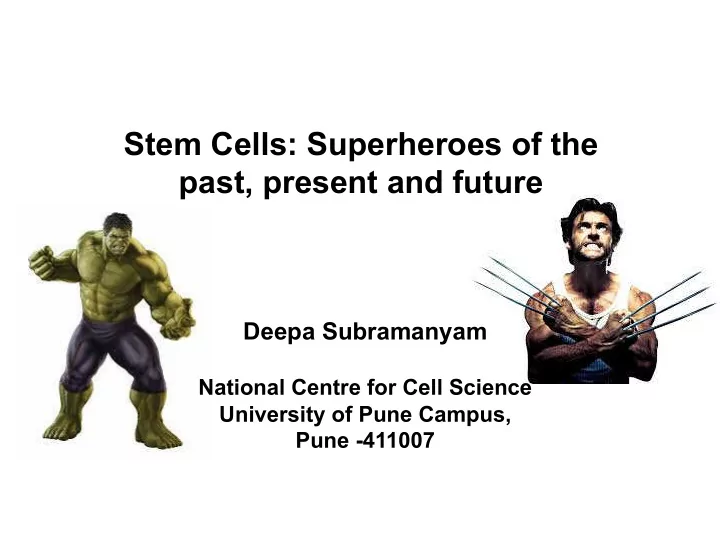

Stem Cells: Superheroes of the past, present and future Deepa Subramanyam National Centre for Cell Science University of Pune Campus, Pune -411007
Even the ancient Greeks knew about regeneration!
Planaria regeneration – winner of the regeneration challenge HHMI Holiday lectures, 2006
Planaria regeneration HHMI Holiday lectures, 2006
Zebrafish fin regeneration HHMI Holiday lectures, 2006
Newt limb regeneration
Why do we have such limited regenerative capacity? Complexity of our body. Protection against cancer. Have we lost the capacity to regenerate or is it suppressed?
www.natomimages.com
Healing vs regeneration HHMI Holiday lectures, 2006
Why do we have such limited regenerative capacity? Complexity of our body. Protection against cancer. Have we lost the capacity to regenerate or is it suppressed?
Cancer development Cancercervix.org.au
Adult Stem Cells Adapted from learn.genetics.utah.edu
Normal development – how does it happen? We never think about it until something goes wrong!
Mice vs humans – model for mammalian development
How does life start? Where do stem cells come into the picture?
Embryonic Stem Cells Adapted from: hjhsstemcells.yolasite.com
But what can stem cells do?
What can we do with stem cells?
But what about stem cells for myself?
We can imagine a ball rolling down a hill, but back upwards? Is it possible to take a cell that is already performing a specific function and take it back to a state where it does not have a fixed role – aka stem cell state?
But how can we get stem cells from ourselves? Is there a magic solution? minus plus Stem cell Specialized cell plus ?? minus Is this reversible? Can we subtract and add specific components to get back a stem cell?
Yes! Now I can make stem cells from my own body cells by addition and subtraction Stem cell Reprogramming!
What can we do with these reprogrammed stem cells?
2 Nobel prizes – one for stem cells and one for reprogramming.
What is scientific research all about?
What do we do in our lab? We study how embryos develop. We study how stem cells become specialized cells. The main question we ask is, whether moving molecules around within a cell affects what a cell becomes.
My trajectory to becoming a scientist Completed school with Maths, Physics, Chemistry, Biology and English –ISC - 1996 BSc in Biochemistry-1999 Integrated MS-PhD from National Centre for Biological Sciences, TIFR, Bangalore-2005 Postdoctoral research from University of California at San Francisco-2012 Faculty at NCCS, Pune – since 2012.
Science as a career option- early options 1) IISER model – Integrated BS/MS- straight after class 12. 2) Fellowships such as KVPY, DST-Inspire.
Science as a career option- slightly later options 1) Masters by research – Tata Institute of Fundamental Research, Mumbai. 2) Integrated MS/PhD –straight after BSc – NCBS Bangalore, Indian Institute of Science Bangalore, IISERs. 3) PhD – after MSc or BE, BTech – all research insitutes.
The important thing is not to stop questioning; curiosity has its own reason for existing – Albert Einstein
Thank you!
Recommend
More recommend